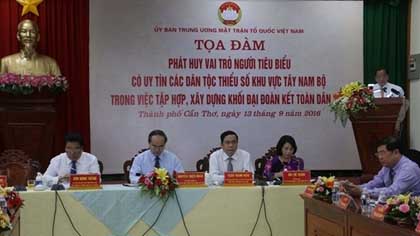Seminar promotes role of minority nationalities in the southwestern region
The Vietnam Fatherland Front (VFF) Central Committee held a seminar in Can Tho City on September 13 to discuss measures to promote the role of outstanding individuals from minority nationalities in the southwestern region to strengthen the great unity of the nation.
 |
| At the seminar on promoting the role of outstanding individuals from minority nationalities in the southwestern region to strengthen the bloc of great national unity. (Credit: VNA) |
The event was chaired by President of the VFF Central Committee Nguyen Thien Nhan.
At the seminar, the delegates shared their experiences and discussed measures to promote the influential figures’ active roles in building and strengthening the great unity of the nation, contributing to the cause of national development, as well as national patriotism campaigns.
There are currently nearly 4,000 influential figures from various national minority groups who are role models in numerous fields including production, poverty reduction, preserving national cultural values, ensuring local security and order and protecting border markers.
Addressing the seminar, the VFF President said that the southwestern region was home to more than 1.4 million national minority people—accounting for nearly 9% of its population—including the Khmer, Hoa (Chinese) and Cham minority nationalities.
He underscored the special attention paid by Party committees at all levels, as well as VFF committees and political and social organisations in localities, to caring for national minority groups.
VFF Vice President Bui Thi Thanh emphasised that the VFF committees at all levels in the region had maintained close relations with national minority groups by visiting and presenting gifts to local people on the occasions of their traditional festivals and listening to their proposals and expectations.
(Source: NDO)
.
 về đầu trang
về đầu trang






